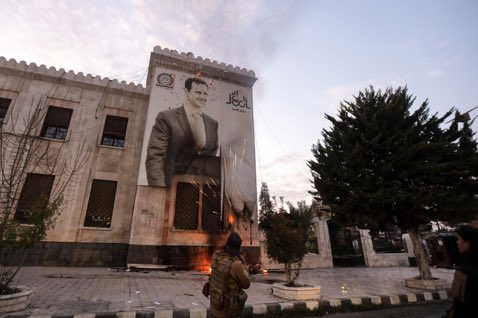The Syrian government fell early Sunday, bringing an abrupt end to the Assad family’s 50-year rule. A rapid rebel offensive swept through government-held territories, reaching the capital within just ten days.
Syrian state television broadcasted a video statement in which a group of men declared President Bashar Assad’s overthrow and announced that all detainees in Syrian prisons had been freed.
The spokesperson for the group, identified as part of the Operations Room to Conquer Damascus, urged both opposition fighters and citizens to safeguard the state institutions of “the free Syrian state.”
Hours before this announcement, the head of a Syrian opposition war monitor reported that Assad had fled the country to an undisclosed location. This came as insurgents claimed they had entered Damascus, following their remarkably swift advance across the nation.

Syrian Prime Minister Mohammed Ghazi Jalali addressed the nation in a video message, stating the government’s readiness to “extend its hand” to the opposition and transfer power to a transitional government. “I am in my house and I have not left, and this is because of my belonging to this country,” Jalali declared. He pledged to return to his office to continue work in the morning and urged citizens to refrain from defacing public property.
Rami Abdurrahman of the Syrian Observatory for Human Rights confirmed that Assad had boarded a flight out of Damascus on Sunday. Iranian state television, Assad’s long-time ally, also reported his departure, citing Qatar’s Al Jazeera network but offering no further details. The Syrian government has yet to issue an official statement.
As dawn broke over Damascus, celebratory scenes unfolded across the city. Residents gathered in mosques for prayers and took to public squares, chanting “God is great” and anti-Assad slogans. Car horns blared, and in some areas, celebratory gunfire erupted. Soldiers and police abandoned their posts, while looters ransacked the Ministry of Defense headquarters.
The night before, opposition forces seized Homs, Syria’s third-largest city, after government troops retreated. Homs, a strategic city connecting Damascus to the coastal provinces of Latakia and Tartus—strongholds of Assad’s support and home to a critical Russian naval base—represented a major loss for the regime.
Rebel forces had already captured Aleppo, Hama, and significant parts of southern Syria in a lightning offensive that began on November 27. Analysts described the fall of Homs as a pivotal moment in the conflict.

The Syrian army’s withdrawal from much of the south further enabled the insurgents, who now control several provincial capitals. The rapid advances marked the opposition’s largest gains in years, led by Hayat Tahrir al-Sham (HTS), a faction with roots in al-Qaida and designated a terrorist organisation by the U.S. and U.N.
The U.N.’s special envoy for Syria, Geir Pedersen, called for urgent negotiations in Geneva to ensure an “orderly political transition.” Speaking at the Doha Forum in Qatar, he emphasised the rapidly evolving situation. Russian Foreign Minister Sergey Lavrov, representing Assad’s chief international ally, expressed his regret, he feels “sorry for the Syrian people.”


